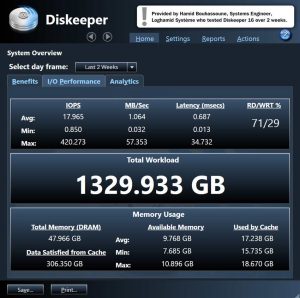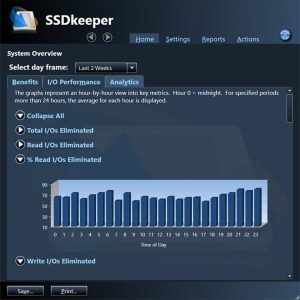Condusiv: I/O Performance Gap With Three I/O Reduction Software
V-locity 7.0, Diskeeper 18 and SSDkeeper 2.0
This is a Press Release edited by StorageNewsletter.com on March 29, 2018 at 2:16 pmCondusiv Technologies Corporation announces the 2018 editions of three products that smash the I/O performance gap as growing volumes of data continue to outpace the ability of underlying server and storage hardware to meet performance SLAs on mission critical workloads like MS-SQL.

The company announces V-locity 7.0, Diskeeper 18, and SSDkeeper 2.0 with ‘no reboot’ capabilities and enhanced reporting that offers a single pane view of all systems to show the exact benefit of I/O reduction software to each system in terms of number of noisy I/Os eliminated, percentage of read and write traffic offloaded from storage, and, most importantly, how much time is saved on each system as a result. Availability is slated for early April.
“When a minimum of 30-40% I/O traffic from any Windows server is completely unnecessary, nothing but mere noise chewing up IO/s and throughput, it needs to be easy to see the exact levels of inefficiency on individual systems and what it means in terms of I/O reduction and ‘time saved’ when Condusiv software is deployed to eliminate those inefficiencies. Since many customers choose to add a little more memory on key systems like MS-SQL to get even more from the software, it’s now clearly evident what 50% or more reduction in I/O traffic actually means,” said Brian Morin, SVP, sales and marketing, Condusiv.
Morin continued: “In our recent 4th annual I/O Performance Survey, we found that MS-SQL performance problems are at their worst level in 4 years despite heavy investments in hardware infrastructure. 28% of mid-sized and large enterprises receive regular complaints from users regarding sluggish SQL-based applications. This is simply due to the growth of I/O outpacing the hardware stack’s ability to keep up. This is why it is more important than ever to consider I/O reduction software solutions that guarantee to solve performance issues instead of reactively throwing expensive new servers or storage at the problem.“
The latest versions of V-locity, Diskeeper, and SSDkeeper are easier to deploy and manage with ‘no reboot’ capabilities, and reporting has been enhanced to enable administrators to quickly see the value being provided to each system along with tuning recommendations for more benefit. Systems are now listed in red, yellow, and green with memory tuning recommendations to achieve a 50% or more reduction in I/O to storage.
“All storage filter drivers require a reboot, which is problematic for admins who manage software across thousands of servers. However, due to our extensive knowledge of Windows Kernel internals dating back to Windows NT 3.51, we were able to find a way to properly synchronize and handle the load/unload sequences of our driver transparently to other drivers in the storage stack so as not to require a reboot when deploying or updating Condusiv software,” said Rick Cadruvi, SVP, engineering, Condusiv.
“As much as Condusiv I/O reduction software has been a real benefit to our applications running across 2,500+ Windows servers, we are happy to see a no reboot version of the software released so it is now truly ‘Set It & Forget It.’ My team is happy they no longer have to wrestle down a reboot window for hundreds of servers in order to update or deploy Condusiv software,” said Blake W. Smith, MSME system director, enterprise infrastructure enterprise technology services information management, Christus Health.
I/O reduction software available for Windows servers and PCs
-
V-locity 7.0 for virtual servers (on premises or in the cloud) guarantees to solve the application performance challenges on I/O intensive systems like MS-SQL or your money back, 90-days – no questions asked.
-
Diskeeper 18 Server for physical servers guarantees to solve the application performance challenges on I/O intensive systems like MS-SQL or your money back, 90-days – no questions asked.
-
Diskeeper 18 Professional enhances the performance of HDD-based corporate laptops and desktops by delivering ‘faster than new’ performance.
-
SSDkeeper 2.0 enhances the performance of SSD-based corporate laptops and desktops by delivering ‘faster than new’ performance.
-
Options include a centralized management console to manage hundreds or thousands of systems via the V-locity Management Console or Diskeeper Administrator.
Key features:
-
Patented IntelliWrite technology eliminates the severe inefficiency in the hand-off of data between the Windows OS and underlying storage system that results in a surplus of excessively small, fractured writes and reads that dampen the performance of all-flash and hybrid SAN, NAS, hyperconverged, and cloud storage. By preventing files from being fractured and broken apart into smaller pieces (with each piece requiring its own I/O operation before being written to disk or SSD in a non-sequential manner), IntelliWrite ensures large, clean contiguous writes and reads for maximum payload with every I/O operation.
-
Patented IntelliMemory caching technology establishes a tier-0 cache strategy by serving hot reads from memory that is otherwise idle or available. Nothing has to be allocated for cache since IntelliMemory is aware moment-by-month of how much memory is unused and only uses that portion to serve hot reads. If a system is ever memory constrained at any time, the caching engine backs off entirely, so administrators never need to be concerned about memory contention. However, with as little as 2-4GB of available memory, IntelliMemory drives big gains by offloading 50% or more read traffic from storage.
-
Patented InvisiTasking intelligent monitoring technology enables Condusiv’s thin filter drivers to operate quietly in the background with near-zero overhead by only using CPU cycles that are otherwise free and idle. This ensures any optimizations to the system by Condusiv software have occurred without intrusion on current activities. If applications or processes ask for CPU cycles, the company’s software backs off as it runs at lowest priority.















 Subscribe to our free daily newsletter
Subscribe to our free daily newsletter

